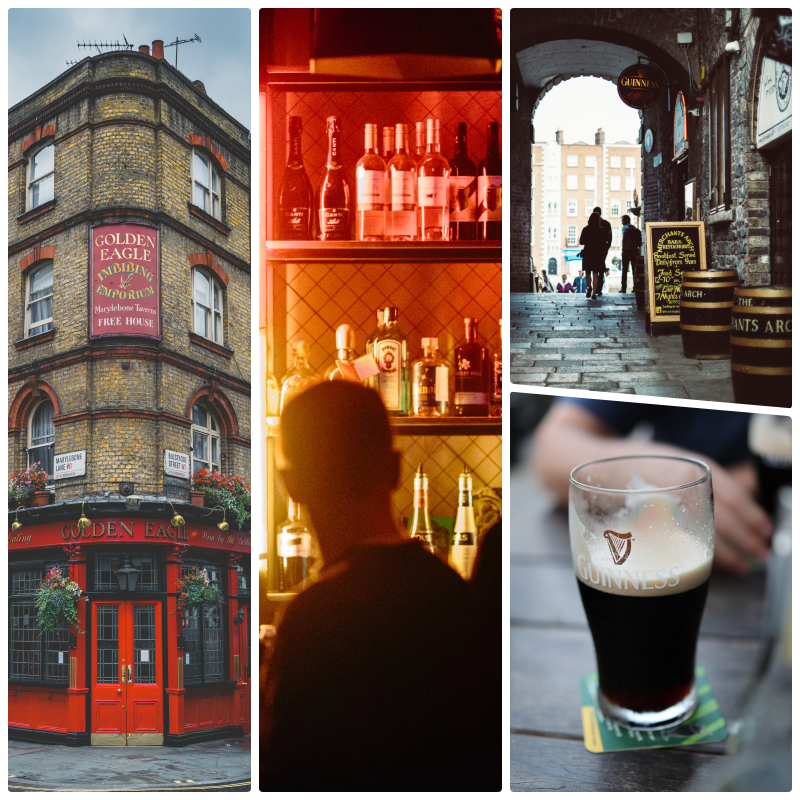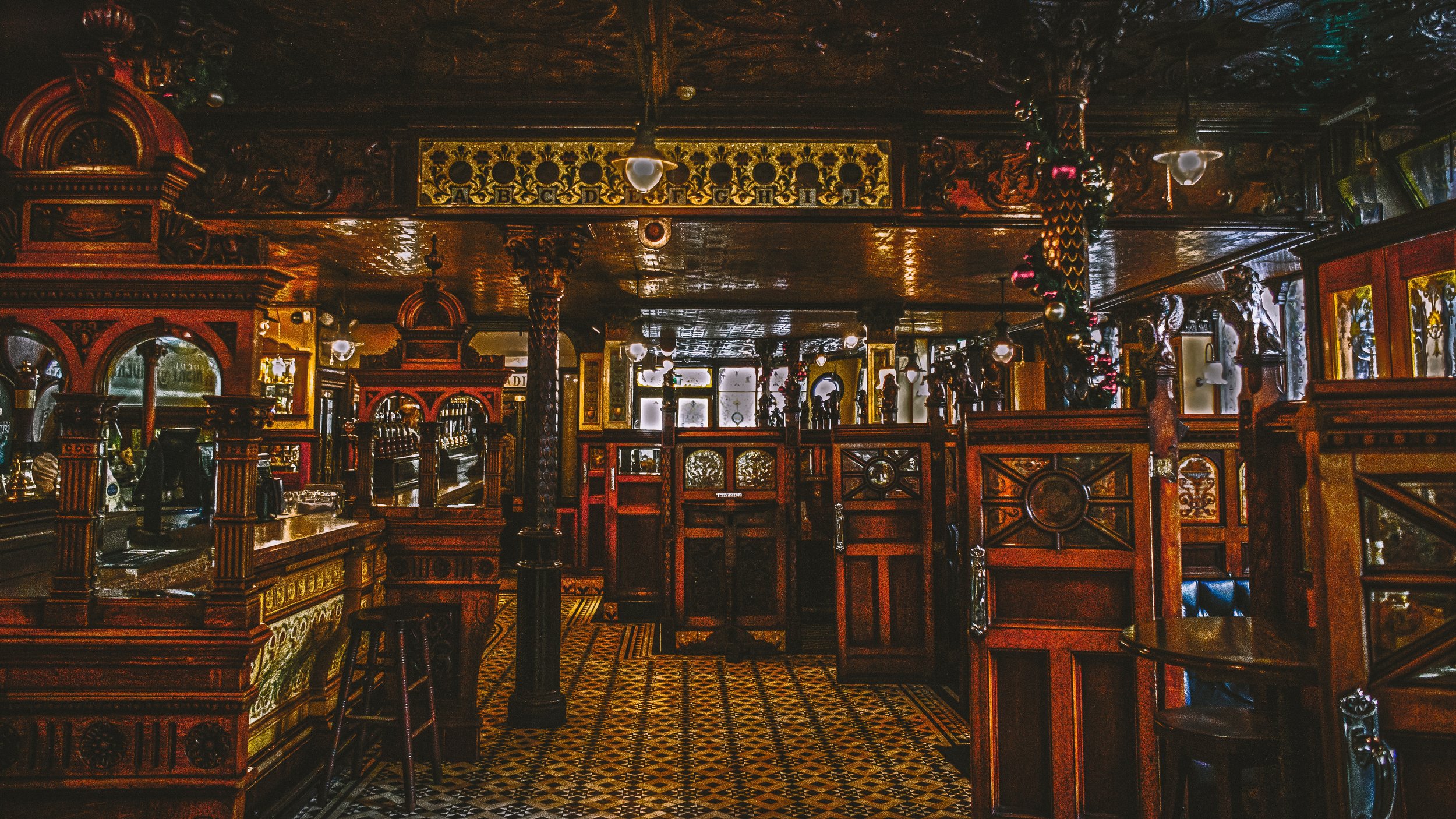For the Love of the Pub
For much of my adult life, pubs have been deeply important spaces. I can’t fathom how many hours I’ve spent laughing, arguing, consoling, and all under the watchful gaze of a pint and a packet of salt & vinegar crisps. In fairness, as a student I worked in various bars and pubs, which heavily weights the scales, but I’ve never been one to refuse an opportunity to meet friends in the safe confines of a local pub. It’s only now, with two small children and very little time, that I realise there’s a large pub shaped hole in my life, one that no quantity of Peppa Pig or Die Sendung mit der Maus will ever fill.
It’s hard to express this love of pubs to Germans without sounding like I’ve got some weird fetish, or a serious drinking problem. It’s not that Germans don’t understand why pubs are fun, they just seem less infatuated with them than most British people. For the British, the pub is an extension of home, especially for those who happen to have a “local” or a pub that they often frequent. The local can be round the corner, or it can be miles away, but what makes it local isn’t the location but the sense of belonging it conjures in the minds of regular patrons. Moreover, in most cases “the local” isn’t some swanky establishment, where fashionable clientele sip colourful and expensive cocktails. For British people, the pub should be first and foremost affordable, have enough seating, and if it’s a high-end gastro-pub, a functioning fireplace.
The closest I’ve come to the concept of “the local” in Germany is Die Wirtschaft. Usually these are pub-like, often a cross between restaurant and pub, which are found in villages or small towns. They have the feel of the British local, with grizzled veterans propping up the bar, quirky staff, and sometimes even a fireplace, but despite the similarities, they aren’t a like for like replacement. One notable difference is the fact that when you enter most Wirtschafts, the server will hand you a menu. I’m not sure why I find this simple process so jarring, but it instantly removes any comparison from my mind.
The local pub isn’t alien to Germans then, and many I’m sure have bars they go to regularly, but it’s rare to see the same level of affection metered out to a standard German Kneipe. Perhaps it’s the fact that many German pubs look rather nondescript, or that they usually don’t have eccentric or historical names. It’s hard to have a deep attachment to places called Gaststätte Madhouse, Bar Norbert's Treff, or Manni’s Eck. It could also be related to how German Kniepe are run, with one major difference between UK and German pubs being the prevalence of table service, which while convenient, tends to eliminate the community element that a good pub fosters. It might be a chore, but standing at a bar can create little moments of interaction with other drinkers, as well as with bar staff, which rarely happens when someone brings your drinks to the table.
When I speak to Germans who’ve travelled to the UK, they will talk about going to a “traditional British pub” which suggests those who’ve been to one see a distinct difference from what’s on offer at home. Where British people might see a normal pub with the standard pub furnishings, Germans see a wealth of British tradition, one that they consider specifically different. This is possibly why Irish pubs appear to be so popular in Germany, and across the whole of Europe. No matter where I’ve travelled throughout the country, I’ve found an Irish pub - even in small villages it’s perfectly possible to turn a corner and find somewhere named “The Shamrock” or “Finnigans”, usually decorated with copious amounts of Guinness logos, and nearly always advertising live music. The very existence of Irish pubs suggests there is a clear difference between German bars and pubs in the British Isles.
While those from Britain and Ireland may see Irish pubs as the standard, Germans tend to find them exotic. Decorated as they are, with a variety of imported pub paraphernalia, they look different, serve different beers, and in the best ones, a range of food you’re unlikely to find in German bars or restaurants. Along with the decor, the atmosphere is quite different, which is due in no small part to the bar staff. Most German bar staff won’t look to sarcastically make fun of customers, unless of course they happen to know each other. This is not the case in most Irish pubs, where it’s perfectly possible to be faced with the caustic wit and a humorous back and forth of the bar staff as soon as you walk through the door, and regardless of whether you’ve actually been there before.
Irish pubs can be a blessing for British and Irish expats or migrants. They’re often a sliver of familiarity for the homesick and a potential chance at employment for new arrivals. When I first moved, it was to the Irish pubs that I turned to when looking for quick employment. Although most will happily find work for the willing, it must be remembered that working in bars and pubs in Germany is not easy. Irish pubs especially are frequently found in and around central points such as train stations, which guarantee a steady flow of customers, but also ensure that they are some of the busiest pubs in any city. Although the work can be tiring, they are also a surprisingly good place for newcomers to hone their German skills with colleagues and customers alike.
However, along with the positives come the negatives. Irish pubs can be so welcoming, so friendly and inviting, that many new arrivals will cling to them like alcohol-fuelled life rafts. Partially, this is because of the importance of pubs as community spaces in British and Irish culture, but also because they’re familiar. When you’re bombarded daily by cultural differences, it’s nice to retreat to somewhere that feels like home. This feeling can easily metastasise, and ultimately prevent British and Irish migrants from experiencing the variety of different German bars and restaurants. There are some in the British and Irish communities of Germany that actively avoid them for this very reason, seeing the comfort they provide as an anathema. Still others will go further and ridicule anyone who happens to prefer Irish pubs to other establishments.
Although I’m far from inclined to agree with these critical voices, I try to avoid Irish pubs as a rule for the reasons mentioned. That’s pretty easy given my pub going days are increasingly limited the more my family expands, but I must also admit there is some amount of joy to be found there. One of the great pleasures of living in another country is experiencing the difference, but that doesn’t mean punishing yourself for enjoying the familiar too. We all want to belong, to build our communities, and frankly there’s few better ways I’ve found than over a pint, no matter where that pint happens to be served.
Proofreader: @ScandiTina
Image Credit
Foto von Connor Danylenko
Foto von Aleksandr Popov auf Unsplash
Foto von K. Mitch Hodge auf Unsplash
Foto von Barbora Dostálová auf Unsplash
Foto von Barbora Dostálová auf Unsplash








